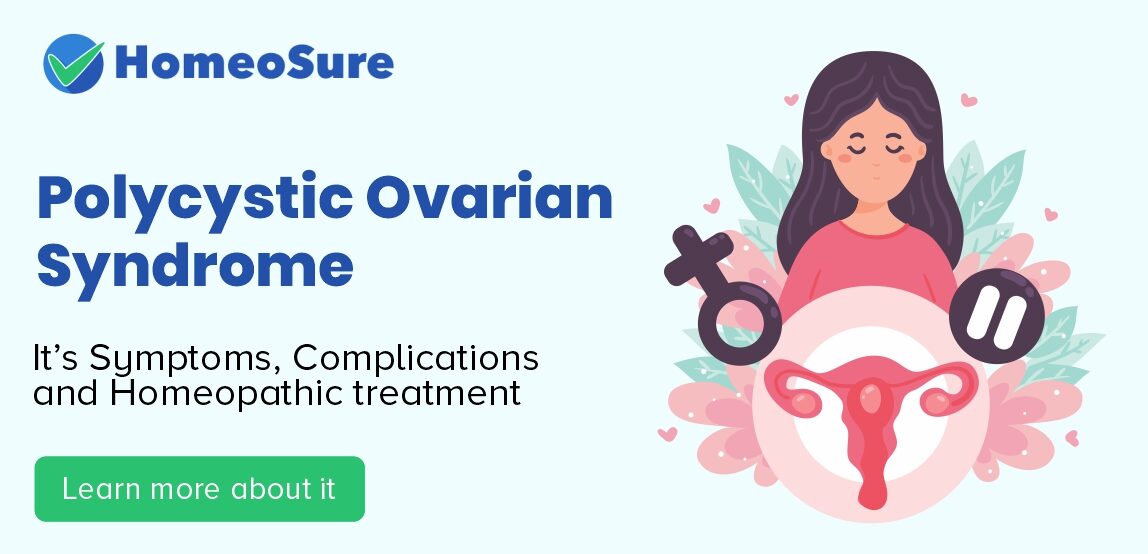Polycystic Ovarian Syndrome
POLYCYSTIC OVARIAN SYNDROME or PCOS is characterized by numerous, small sac-like cavities known as cysts in the ovaries and hence the name Polycystic Ovarian Disease or Polycystic Ovarian Syndrome (PCOS). PCOS is the most common hormonal disorder prevailing in females in the reproductive age group and has become the most troublesome female problem seen nowadays. It disturbs the menstrual cycle tremendously and women are never certain about ‘that time of the month’. That is why PCOS is the most common cause of infertility.
6 out of 10 girls do not have a fixed cycle and day-by-day, it is getting worse.
CAUSES OF PCOS
The cause of PCOS is not fully understood, but genetics may be a factor. PCOS seems to run in families, so your chance of having it is higher if other women in your family have it or have irregular periods or diabetes. PCOS can be passed down from either your mother’s or father’s side.
For reasons that are not well understood, in PCOS the hormones get out of balance. For example:
- The sex hormones get out of balance. Normally, the ovaries make a tiny amount of male sex hormones (androgens). In PCOS, they start making slightly more androgens. This may stop ovulation, get acne, and grow extra facial and body hair.
- The body may have a problem using insulin, called insulin resistance. When the body doesn’t use insulin well, blood sugar levels go up. Over time, this increases your chance of getting diabetes.
SYMPTOMS OF PCOS
The three main features of PCOS are:
- Irregular periods: which means your ovaries don’t regularly release eggs (ovulation)
- Excess androgen: high levels of “male hormones” in your body, which may cause physical signs such as excess facial or body hair (see signs and symptoms below)
- Polycystic ovaries: your ovaries become enlarged and contain many fluid-filled sacs (follicles) which surround the eggs (it’s important to note that, despite the name, if you have PCOS you don’t actually have cysts)
COMPLICATIONS OF PCOS
PCOS can complicate and can be associated with the following conditions, considering obesity to be an important factor:
- High Blood Pressure
- Elevated levels of triglycerides, and bad cholesterol
- Metabolic Syndrome: It is the cluster of signs and symptoms that indicate significantly increased risk of heart diseases.
- Type 2 Diabetes: This occurs due to resistance of body to respond to insulin.
- Abnormal uterine bleeding
- Endometrial Cancer: Cancer of the inner lining of the uterus can be caused by continued exposure to high levels of oestrogen.
HOMEOPATHIC TREATMENT
Homeopathic approach towards management of PCOD is constitutional, taking into account the presenting complaints along with physical, mental and genetic make-up that individualizes a person. Homeopathic medicines which act at root level can bring back deviations of hormonal system back to normalcy and in many cases abolish the need for exogenous hormones with their side-effects and complicating surgical procedures. Moreover, with this hormonal harmony, chances of conception increase significantly.
Homeopaths have treated thousands of such cases and brought stability in the menstrual cycle of many women in the shortest possible time. Homeopathy treats the disease with motherly care (most natural way) and restores the cycle more or less permanently.
Homeopathic treatment is targeted towards UPROOTING THE DISEASE and ensuring health with no side effects. For prescribing to an individual, a PLAN OF TREATMENT is followed which involves:
- GETTING THOROUGH UNDERSTANDING OF CASE which includes complete case taking (analyzing patient as an individual) along with patient history and family history
- DIAGNOSIS OF PATIENT AND DISEASE
- INDIVIDUAL ASSESSMENT OF THE CASE
- PRESCRIBING THE MOST SUITABLE INDIVIDUAL CONSTITUTIONAL REMEDY
